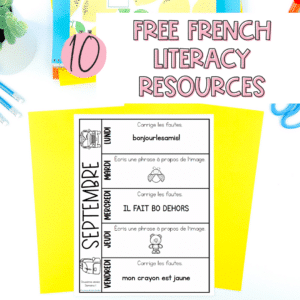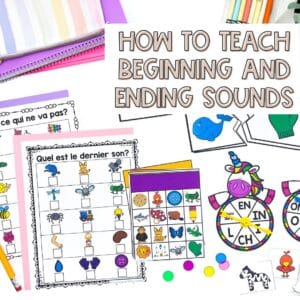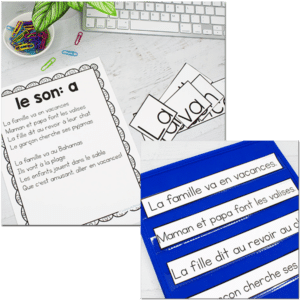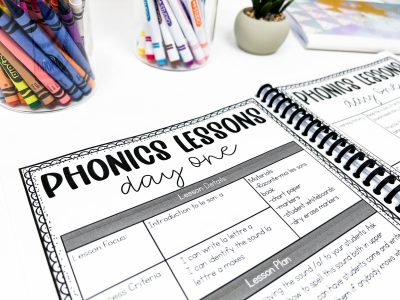For years, schools have been using GB+ and levelled readers, but it’s time that we move away from that and towards using best practices, based on science. I have been doing a lot of workshops, and one thing I’ve learned is about the importance of acquiring French phonological awareness skills in order to learn to read successfully.
GB+ books and other French levelled readers have been used for a long time, and I’ve always found them problematic. They are direct translations of English books. A Level 1 reader goes from “look at me I can dig” to “Regarde moi, je creuse.” Words like creuse are not in the vocabulary of a beginning second language learner. Not to mention, it includes a CC blend and complex sounds.
In 2019, the Right to Read inquiry found that Ontario’s public education system is failing students with reading disabilities and struggling readers. All because they are not using evidence-based approaches to reading. If we care about our students; French reading comprehension skills, we must be willing to undo old practices that aren’t serving our students anymore.
Essentially, any students who are struggling with decoding will have a really hard time reading these books. There are skills they need to learn before getting to that stage. So, how can we increase students’ French reading comprehension without these tools? Where do we go from here?

How to Improve French Reading Comprehension
First, you have to understand the science of reading. The science of reading is literally the research and data collected about how students learn to read. Research has told us that phonics needs to be taught explicitly to students. And that using levelled reader testing (like GB+) is not the best practice for figuring out which reading skills students are doing well in and which ones they need more help in (because as mentioned, these texts are way too advanced for many beginning readers).

Instead, the science of reading says that in order to achieve French reading comprehension, we need to have language comprehension (background knowledge, vocabulary, language structures, etc) and decoding skills (phonological awareness, sight recognition, etc.) Together, these pieces lead to comprehension.
Phonological Awareness
Phonological awareness is the ability to recognize and consciously manipulate phonemes in words. It’s being able to see the word in parts. For instance, can a child differentiate between a word, sound, and sentence? Can they identify the number of words in a sentence?
It also plays a role in recognition, such as identifying the number of syllables, rhyming words, or initial sounds of words. Lastly, it includes manipulation skills, like phoneme addition, deletion, and substitution. If you take a look at the chart, you can get an idea of how all of the skills within phonological awareness build upon each other.
Phonological awareness is a key foundational skill for French reading comprehension. It is one of the first skills students need to have in order to move toward comprehension.
In order to become a strong decoder, you need oral language development, phonological and phonemic awareness, linking letters to sounds, seeing patterns and relationships, and building a strong sight word memory.

Assessing French Phonological Awareness Skills
Assessing phonological awareness skills gives you an idea of what students’ strengths and weaknesses are and what you need to focus on during small group instruction. It’s essential that you monitor students’ progress and assess where they are because they need to master the skills to be strong readers.
These French Phonological Awareness Assessments make it easy to track and monitor student progress over time. This set resource includes 10 French Science of Reading-based assessments and is perfect for any primary French immersion classroom.
The assessments include a focus on alphabet & letter sounds, syllables, rhyming words, beginning sounds, and more.
Get the French Phonological Awareness Assessments
How to Use the Phonological Awareness Assessments
I always suggest starting with letter sounds and letter names assessment. If students don’t know all their letter sounds, they can’t learn to read successfully. Once you have an idea of where students are at with this initial assessment, you can decide where to go next.
Many of the assessments come with little cards for the students to read from. To make things simple, all cards are coded so you know which set goes with which assessment! Pro tip: I also write my students’ names on the assessments ahead of time, so I don’t accidentally miss a student (or forget to write their name down)!
While you administer the assessment, have the rest of the class complete a low-key self-directed activity. This will prevent any disruption while you test students. Also, you want to save students energy for the exam, so don’t provide any work that is too challenging and can’t be completed alone.
After the Assessment
Once you have collected data from the assessments, create small groups based on their needs. Do targeted and differentiated practice in your small groups. As you practice, continually check-in and assess students to see if they are mastering the concept.
Remember, phonological awareness is a continuum. They need to grasp the earlier concepts in order to successfully do the more advanced ones. If a student does very well on a specific skill, then you don’t need to repeat the assessment with them. But if they did poorly on the assessment, you can have students take it again after targeted practice.
You can use resources like these French Decodable Readers for your targeted practice. This resource includes 15 French decodable readers that focus on vowel sounds, including accents. They are also aligned with the French Science of Reading!
You can also utilize the French Sound Wall in your classroom. There is a card for each phone, along with real mouth pictures on each card. The resource includes 47 French sound posters, student reference pages, an International Phonetic Alphabet chart, and more.
Want to check out the resources listed?
All the links above lead to TPT, but the resources are also available on our website. Here are the resources available here for purchase in CAD. Don’t forget you can also buy credits for an additional discount (up to $15 off).
-
 French Decodable Books for Compound Sounds | French Science of Reading$ 7.50
French Decodable Books for Compound Sounds | French Science of Reading$ 7.50 -
 French Sound Wall | French Phonics Board with Real Pictures | Mur de sons$ 8.50
French Sound Wall | French Phonics Board with Real Pictures | Mur de sons$ 8.50 -
 French Decodable Vowel Books | French Science of Reading$ 7.50
French Decodable Vowel Books | French Science of Reading$ 7.50 -
 French Phonological Awareness Assessments | French Science of Reading Assessment$ 13.00
French Phonological Awareness Assessments | French Science of Reading Assessment$ 13.00
Don’t forget to check out more posts about the Science of Reading in French!










